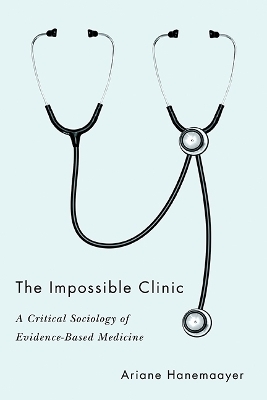
The Impossible Clinic
A Critical Sociology of Evidence-Based Medicine
Seiten
2020
University of British Columbia Press (Verlag)
978-0-7748-6208-0 (ISBN)
University of British Columbia Press (Verlag)
978-0-7748-6208-0 (ISBN)
- Titel z.Zt. nicht lieferbar
- Versandkostenfrei
- Auch auf Rechnung
- Artikel merken
Once considered revolutionary, evidence-based medicine (EBM) has failed. The Impossible Clinic explores the conundrum of EBM's attempt to translate evidence from medical research into recommendations for practice. Ironically, when medical institutions combine disciplinary regulations with EBM to produce clinical practice guidelines, the outcomes are antithetical to the aim. Such guidelines fail to increase individual physicians' decision-making capacities – as EBM promises – because they externalize judgment through disciplinary control. Ariane Hanemaayer uses a critical sociology approach to argue that EBM persists because it has congealed within the dominant liberal political strategy of governance, which seeks to improve health care "at a distance," at the least cost, and without investment in infrastructure. As such, The Impossible Clinic is the first book to interrogate the history, practice, and pitfalls of EBM and explain how it persists due to intersecting relationships between professional medical regulation and liberal governance strategies.
Ariane Hanemaayer is an assistant professor of sociology at Brandon University in Manitoba. With Christopher J. Schneider, she is the co-editor of The Public Sociology Debate: Ethics and Engagement (2014).
Introduction
1 Conversations in Medicine: Problematizing Clinical Practice
2 Institutional Sites: McMaster University and Canada's Contribution to Medical Training
3 Responsibilizing a New Kind of Clinician: Problem-Based Learning
4 Technologies of Regulation: Clinical Practice Guidelines and the Effects of Normalization
5 The Impossible Clinic: Biopolitics, Governmentality, Liberalism
Conclusion
Notes; References; Index
| Erscheinungsdatum | 22.01.2020 |
|---|---|
| Verlagsort | Vancouver |
| Sprache | englisch |
| Maße | 152 x 229 mm |
| Gewicht | 380 g |
| Themenwelt | Medizin / Pharmazie ► Medizinische Fachgebiete |
| Studium ► 1. Studienabschnitt (Vorklinik) ► Med. Psychologie / Soziologie | |
| Studium ► Querschnittsbereiche ► Geschichte / Ethik der Medizin | |
| ISBN-10 | 0-7748-6208-4 / 0774862084 |
| ISBN-13 | 978-0-7748-6208-0 / 9780774862080 |
| Zustand | Neuware |
| Informationen gemäß Produktsicherheitsverordnung (GPSR) | |
| Haben Sie eine Frage zum Produkt? |
Mehr entdecken
aus dem Bereich
aus dem Bereich
Antworten – prägnant und praxisnah für Psychiatrie, Psychotherapie, …
Buch | Hardcover (2024)
Urban & Fischer in Elsevier (Verlag)
CHF 75,60


